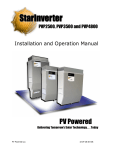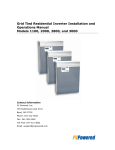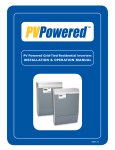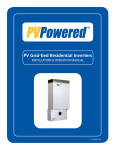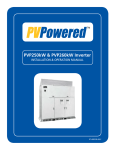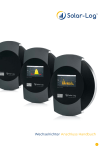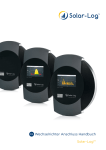Download PV Powered PVP1800 Specifications
Transcript
PVP1100, PVP1800, PVP2800 Installation and Operation Manual PV Powered Delivering Tomorrow’s Solar Technology . . . Today PV Powered LLC 11-18-28-704 StarInverter PVP1100, PVP1800 and PVP2800 Table of Contents IMPORTANT SAFETY INSTRUCTIONS 2 1.0 INTRODUCTION 3 2.0 INSTALLATION 5 2.1 SELECTING A LOCATION FOR THE STARINVERTER 2.2 MOUNTING THE STARINVERTER 5 6 6 8 9 10 11 13 15 16 2.2.A STEPS TO MOUNT THE STARINVERTER 2.2.B ATTACHING THE OPTIONAL AC DC DISCONNECT BOX 2.3 ELECTRICAL CONNECTION 2.3.A 2.3.B 2.3.C 2.3.D 2.3.E GROUNDING CONNECTING THE STARINVERTER TO THE ELECTRICAL GRID CONNECTING DC WIRES/PV PANELS CONNECTING THROUGH THE OPTIONAL AC DC DISCONNECT BOX CONNECTING COMMUNICATIONS 3.0 OPERATION 17 3.1 START UP PROCEDURES FOR THE STARINVERTER 3.2 LED INDICATOR LIGHTS/VACUUM FLUORESCENT DISPLAY 17 18 18 3.2.A LED INDICATOR LIGHTS (MODEL PVP1100) 3.2.B LED INDICATOR LIGHTS/VACUUM FLUORESCENT DISPLAY (MODELS PVP1800 AND PVP2800) 3.3.A DATA LOGGING WITH THE PVP COMMAND CENTER 19 21 23 4.0 TROUBLESHOOTING 24 5.0 SPECIFICATIONS 26 6.0 LIMITED WARRANTY 27 3.3 PVP COMMAND CENTER PV Powered LLC 1 11-18-28-704 IMPORTANT SAFETY INSTRUCTIONS This product has been engineered and manufactured to ensure your personal safety. Improper use may result in potential electrical shock or burns. Please read and follow all instructions for installation, use and servicing of this product. SAVE THESE INSTRUCTIONS – This manual contains important instructions for the StarInverter model numbers PVP1100, PVP1800 and PVP2800 that must be followed during installation and maintenance of the StarInverter. CAUTION: ♦ All electrical installations should be done in accordance with local electrical codes and the National Electrical Code (NEC), ANSI/NFPA 70. ♦ Before connecting the StarInverter to the electrical utility grid, approval must be granted by your utility company. Only qualified electricians should make the connection. ♦ When exposed to light, PV-arrays create electrical energy that could cause a hazardous condition. To avoid this, completely cover the surface of all PV-arrays with opaque (dark) material before wiring them. ♦ The StarInverter contains no user-serviceable parts. Refer servicing to qualified service personnel. ♦ Do not touch the heat sink located at the top of the StarInverter. Temperatures can exceed 158 degrees (70° C). Please read all safety warnings and instructions before beginning the installation or operation of the StarInverter. SAVE THESE INSTRUCTIONS PV Powered LLC 2 11-18-28-704 1.0 INTRODUCTION The PV Powered StarInverter is a utility interactive inverter for photovoltaic (PV) systems. The StarInverter is tied to an electrical source provided by the local utility company (i.e. on-grid), as well as to the photovoltaic system. The StarInverter contains everything needed to convert the DC voltage generated by the solar arrays into the AC voltage required to power a house. Because the inverter is tied to a local utility source, if a house’s electrical needs exceed the power generated by the solar arrays, the house automatically taps into its local power supply for that additional electricity. Likewise, if a house does not utilize all the power generated by the solar panels, the inverter actually reverses the flow of electricity (i.e. electricity is fed back into the grid). Think of it as accumulating credits of electricity with the utility for future use. The information contained within this manual will provide all the information necessary for successful installation and use of the StarInverter. Product Features Command Center Software Revolutionary software developed by PV Powered establishes a new industry standard for ease of use. Monitor the status and efficiency of energy generated by the PV system on screen and in real time. Easy Installation The custom designed mounting brackets and easy-to-follow instructions make installation simple and quick. Figure 1: PVP Command Center Simple, Innovative Design Everything needed to power up the StarInverter is contained within the inverter box, including AC and DC connections and circuits. Low part count keeps costs down and simplifies the installation and troubleshooting processes. Safety Features The StarInverter is designed for safety. Control power comes from the utility grid, ensuring that power can never be generated during a utility grid failure. The output stage transformer guarantees isolation of the utility grid and PV modules. Expandability The StarInverter is designed with growth in mind, from residential to commercial use. Most PV system configurations can be accommodated. System Flexibility There are three connection options available with the StarInverter. These options vary depending on your model. See Figures 2 and 3. Refer to your local utility provider for specific connection requirements per regulations. PV Powered LLC 3 11-18-28-704 PVP1100 Option 1 Option 2 Option 3 Use the optional PV Powered AC DC Disconnect. Use the optional PV Powered AC DC Disconnect with a utility grade meter. Use a second party AC and DC Disconnect. Utility Grid Connection Option #1 PVP1100 Solar Panels Solar Panel Solar Panel Solar Panel AC/DC Disconnect AC Load Center Connection Option #2 PVP1100 Solar Panels Solar Panel Solar Panel Solar Panel AC/DC Disconnect Connection Option #3 Solar Panels Solar Panel Solar Panel Solar Panel DC Disconnect PVP1100 AC Disconnect Figure 2: StarInverter PVP1100 Connection Options PVP1800 and PVP2800 Option 1 Option 2 Option 3 Use the DC/GFI Circuit Breakers located inside the inverter. Use the DC/GFI Circuit Breakers inside the inverter with a utility grade meter. Use a second party AC and DC Disconnect. Utility Grid Connection Option #1 Solar Panels Solar Panel Solar Panel Solar Panel PVP1800/2800 AC Load Center Connection Option #2 Solar Panels Solar Panel Solar Panel Solar Panel PVP1800/2800 Connection Option #3 Solar Panels Solar Panel Solar Panel Solar Panel DC Disconnect PVP1800/2800 AC Disconnect Figure 3: StarInverter PVP1800 & PVP2800 Connection Options PV Powered LLC 4 11-18-28-704 2.0 INSTALLATION 2.1 Selecting a Location for the StarInverter In choosing a location for the StarInverter, consideration should be given to the following criteria: ♦ The heat sink temperatures can exceed 158 degrees (70° C). The StarInverter must be installed so that the top of the unit is not expected to be contacted by persons. ♦ The StarInverter is suitable for installation both indoors and outdoors and the enclosure has been given a NEMA 3R rating. ♦ When the StarInverter is installed outdoors, it should be shielded from rain and direct sunlight, if possible. ♦ The StarInverter is designed to handle the temperature extremes of most climates. The operating and non-operating ambient temperature range is from -25° C to 40° C. ♦ The following clearances are recommended for proper placement of the StarInverter: • A minimum 36″ clearance between the bottom of the inverter box and the ground. • A minimum 12″ clearance above the inverter box for ventilation. • A minimum 8” clearance around the side of the inverter box so that all Warning and Caution labels are clearly visible and able to be easily read. • Visibility of the operating LED’s and display located at the top front of the inverter box should also be considered. ♦ If the StarInverter is to be installed in an enclosed cabinet or closet, external ventilation must be provided to allow for sufficient heat dissipation. ♦ At all times, air circulation around the inverter box must be sufficient. PV Powered LLC 5 11-18-28-704 2.2 Mounting the StarInverter The StarInverter should be mounted vertically to a flat, solid surface such as wallboard, concrete or wood siding. The inverter should be located in close proximity to the solar panels to minimize the DC wire length. The two mounting brackets provided make mounting the StarInverter quick and simple. There is one bracket for the top and one for the bottom. The two screw holes in each bracket are 16 inches apart. Once the wall studs are located, anchoring the brackets becomes an easy task. WARNING: Prior to drilling holes to mount the StarInverter in the location selected, ensure there are no electrical wires or plumbing in the area. CAUTION: The National Electrical Code (NEC) requires that the inverter be connected to a dedicated circuit with no other outlets or devices connected to the same circuit. See NEC Section 690-64(b)(1). The NEC also places limitations on the size of the inverter and the manner in which it is connected to the utility grid. See NEC Section 690-64(b)(2). CAUTION: To reduce the risk of fire, connect the PVP1800 or PVP2800 only to a circuit with 20 amps maximum branch-circuit overcurrent protection in accordance with the National Electrical Code (NEC), ANSI/NFPA 70. The PVP1100 must be connected to a circuit with 15 amps maximum branch-circuit overcurrent protection in accordance with the National Electrical Codde (NEC), ANSI/NFPA 70. 2.2.a Steps to Mount the StarInverter 1. Locate the wall studs in the desired location and mark upper mounting bracket screw holes. 2. MAKE SURE BRACKET IS LEVEL. Drill holes for the screws through the holes on the bracket. Use heavy-duty molly bolts or anchors if mounting into drywall only. See Figure 4. Figure 4: Upper Mounting Bracket PV Powered LLC 6 11-18-28-704 3. Remove the front cover of the StarInverter by unscrewing the two cover screws located on the bottom of the inverter. (The PVP2800 will have four cover screws located on the front and bottom of the inverter.) 4. Attach the lower mounting bracket, being careful not to damage the heat sink cooling fins. See Figure 5. Figure 5: Underside of StarInverter and Lower Mounting Bracket 5. Carefully bring the inverter right side up and hang it on the upper bracket. 6. Verify inverter is level. Seal the upper mounting holes on the inverter with RTV. 7. Mark the locations of the lower mounting bracket holes. Drill holes into studs or install wallboard anchors as necessary. 8. Screw in the bottom screws of the bottom bracket to anchor the bracket to the wall. Refer to Figure 6. Figure 6: Mounted StarInverter with Mounting Brackets in place. PV Powered LLC 7 11-18-28-704 If installing the PVP1100 with the optional AC DC Disconnect Box, see step 2.2.b. If installing the PVP1100 without the AC DC Disconnect Box or if installing the PVP1800 or PVP2800, please proceed to section 2.3 Electrical Connection. PLEASE NOTE: Leave the inverter cover off to allow for electrical connection in section 2.3. 2.2.b Attaching the OPTIONAL AC DC Disconnect Box* *NOTE: Certain utility companies require this equipment per regulations. you are unsure of these regulations, contact the utility provider. If the Disconnect Box is not required, proceed to section 2.3. If 1. Attach the optional StarInverter AC DC Disconnect Box as depicted in Figures 7 through 9. Holes are threaded for four 10-32 screws at the top of the AC DC Disconnect Box. Place the screws through the holes in the bottom of the PVP1100 and into the top of the Disconnect Box. 2. Tighten the four screws to a torque value between 2.0 and 2.5 Nm. Figure 7: AC DC Disconnect Box Figure 8: Location of screw holes for AC DC Disconnect Box Figure 9: Installed AC DC Disconnect Box PV Powered LLC 8 11-18-28-704 2.3 Electrical Connection Do not proceed with the electrical connection of the StarInverter until it has been properly mounted. WARNING: Electrical connections must be done in accordance with local electrical codes and the National Electrical Code (NEC), ANSI/NFPA 70. Use 10 AWG, minimum 90° (194°F), copper wire for all PVP1800 and PVP2800 connections. Use 14 AWG, minimum 90° (194°F), copper wire for all PVP1100 connections. Voltage drop as well as other considerations may dictate that larger wire sizes be used. WARNING: Make sure the main 120/208/240 volt breaker in the main utility breaker box is switched OFF before wiring the StarInverter. This breaker should be switched ON only after all wiring has been completed as set forth in this manual. WARNING: Follow the order listed below in wiring the StarInverter. Failure to do so may result in hazardous voltages or disconnection of contacts. Terminal connections for the StarInverter are located inside the inverter on the circuit board at the bottom of the box. Solid wires up to 8 AWG (6mm²) and flexible wires up to 10 AWG (4mm²) are accepted by the AC terminals. Wires up to 6 AWG are accepted by the DC terminals. CAUTION: The input and output circuits are isolated from the enclosure. System grounding, when required by Sections 690-41, 690-42, and 690-43 of the National Electric Code (NEC), ANSI/NFPA 70-1999, is the responsibility of the installer. Figure 10: Communications, AC and DC ports. PV Powered LLC 9 11-18-28-704 2.3.a Grounding ♦ ♦ A single point ground connection is located in the lower right hand side of the StarInverter cabinet. The PV panel grounding wire is terminated there. The AC ground connection is terminated next to the Line and Line 2/Neutral connections on the circuit board. The PV ground is bolted to the cabinet with a ¼-20 bolt. (Refer to Figure 12.) Figure 11 includes schematic representations of the PVP1100, PVP1800, and PVP2800 single point grounding. The front cover is grounded through the two cover mounting screws. + PVP1100 Control pcb Power Distribution PCB PV DC input 90-180 VDC 120 VAC 60Hz - L Line Filter 15 A SB N GND DC Power Supply PV GND To dedicated AC circuit System Block Diagram PVP 1800 Control pcb 15A + 120 VAC 60Hz 1A PV DC input 120-360 VDC Power Distribution PCB Line Filter - 20 A SB DC Power Supply PV GND L1 N GND GND System Block Diagram PVP 2800 + Power Distribution PCB 15A 208/240 VAC 60Hz 1A - Line Filter PV DC input 240:200-450 VDC 208:180-450 VDC Control pcb 15 A SB DC Power Supply PV GND L1 L2 GND GND System Block Diagram Figure 11: System Block Diagram showing single point ground point PV Powered LLC 10 11-18-28-704 Figure 12: AC and PV Grounding 2.3.b Connecting the StarInverter to the Electrical Grid Inside the StarInverter are two circuit boards: ♦ ♦ The Control Board The Power Distribution Board with a D-sub socket or an optional terminal block for communications to a personal computer and: • The AC connection terminal • The DC connection terminal • The Internal AC grid fuse(s) WARNING: For continued protection against risk of fire, replace only with same type and ratings of fuse. For models PVP1800 and PVP2800 use only Littelfuse 326020 20 AMP 250V AC. For model PVP1100 use only Littelfuse 326015 15 AMP 250V AC. PV Powered provides overcurrent protection on the Power Distribution Board with two 20 AMP fuses for models PVP1800 and PVP2800 and with one 15 AMP fuse for model PVP1100. (See warning above). Overcurrent protection is also provided with the optional AC DC Disconnect Box available with the PVP1100 and with the included DC/GFI circuit breakers on the PVP1800 and PVP2800. Additional overcurrent protection for the inverter’s AC output is provided by circuit breakers at the breaker panel. The StarInverter is connected to the electrical grid using 3 wires - the LINE, LINE 2/NEUTRAL and GROUND. Please Note: To avoid an increase in AC voltage to unacceptable values while the StarInverter is connected, the grid impedance value at the connection point should be as low as possible. By keeping the grid impedance value low, higher system efficiency will be achieved. PV Powered LLC 11 11-18-28-704 The total impedance of the grid plus the interconnecting AC wires should be less than 1.25 Ohm. WARNING: Make sure the main 120/208/240 V breaker at the circuit breaker panel is switched off before you connect the AC terminal block. To wire the StarInverter to the main utility grid, follow the steps outlined below (refer to Figure 13): 1. Run the conduit from the main breaker panel to the bottom of the StarInverter and insert the fitting in the center opening of the StarInverter, fastening with a locking nut. 2. Feed the LINE, LINE 2/NEUTRAL and GROUND wires through the conduit and into the center opening of the StarInverter. 3. Connect the GROUND wire to the terminal marked ‘earth ground’ inside the StarInverter. 4. Connect the LINE 2/NEUTRAL wire to the terminal marked ‘line 2/neutral’ inside the StarInverter. 5. Connect the LINE wire to the terminal marked ‘line’ inside the StarInverter. 6. Ensure all connections are wired correctly and properly torqued. Tighten the terminal block screws to 0.5 Nm. Figure 13: AC wiring for the line, line 2/neutral and ground wires. PV Powered LLC 12 11-18-28-704 2.3.c Connecting DC Wires/PV Panels WARNING: Before proceeding with the DC wiring, completely cover the surface of all PV-arrays with dark material to avoid the production of electrical current. WARNING: Make sure the polarity and the PV panel voltage between the + and the – cable connectors of the PV panels are correct. Then connect the panels to the DC terminal block on the power distribution board. The PV panel open circuit voltage should be at or below the listed voltages in Figure 14 under all circumstances. Each DC input to the DC terminal block must be less than the voltages listed in Figure 14. StarInverter Model PV Panel Open Circuit Voltage DC Input to DC Terminal Block PVP1100 180VDC 180VDC PVP1800 360VDC 360VDC PVP2800 450VDC 450VDC Figure 14: PV open circuit voltages. To wire the DC inputs from the PV panels to the StarInverter (refer Figure 15): Note: Each DC input connection must carry the same input voltage. The StarInverter allows up to three connections for both the + and the – pole. 1. Calculate the maximum open circuit (no load) for each series panel connection. FOR ALL TEMPERATURE CONDITIONS, THE OPEN CIRCUIT VOLTAGE FOR EACH SERIES CONNECTION MUST TOTAL LESS THAN THE OPEN CIRCUIT VOLTAGE INDICATED IN FIGURE 14 FOR THE CORRESPONDING STARINVERTER MODEL. Review your panel’s data sheet for operating temperature ranges. 2. Keep track of the array positive and negative leads and mark them clearly. 3. Route the PV array leads through the far right opening in the StarInverter. 4. Connect each series positive DC lead to the positive terminals of the power distribution board. PV Powered LLC 13 11-18-28-704 5. Connect negative DC leads directly to the negative terminal on the power distribution board. 6. Connect the ground wire(s) to the ground lug. 7. Confirm that the DC disconnect is turned off and remove the material from the array. With a voltmeter, check the PV array positive leads and confirm that the voltage is positive when referenced to the negative leads. The reading should match your series Voc total. Figure 15: DC Wiring PV Powered LLC 14 11-18-28-704 2.3.d Connecting Through the Optional AC DC Disconnect Box (PVP1100 Model Only) Refer to Figure 16 for a diagram of the AC and DC wiring when using the optional PV Powered AC DC Disconnect Box. Ensure all connections are wired correctly and properly torqued. The nominal value of tightening torque to be applied to the clamping screws for the breakers is 2.0 – 2.5 Nm (18-22 LB-IN). PVP 1100 + Control pcb Power Distribution PCB PV DC input 90-180 VDC 120 VAC 60Hz Line Filter - 15 A SB L N GND DC Power Supply PV GND System Block Diagram AC DC Disconnect 15A PV Positive 1A 15 A DC Breaker &GFI Negative Ground 15A GND N L 15 A AC Breaker To dedicated AC circuit Figure 16: AC and DC wiring with the AC DC Disconnect Box Figure 17: Views of the AC DC Disconnect Box PV Powered LLC 15 11-18-28-704 2.3.e Connecting Communications (Optional Step) To connect the communications and load the software follow the steps outlined below (Refer to Figures 18 and 19): 1. Hardwire the communications cable to the communication terminal, or plug in the D-sub cable to the serial port. Figure 18: Communications located on the Power Distribution Board Serial Connection Table 5 Pin Screw Terminal Connector Serial Cable 1 2 3 4 5 7 2 4 3 5 Serial Function Request to Send (RTS) Receive Data (Rx) Data Terminal Ready (DTR) Transmit Data (Tx) Signal Ground (SG) Figure 19: Hardwiring the serial connection 2. Replace the front cover of the StarInverter and tighten the two or four screws located on the cover. PV Powered LLC 16 11-18-28-704 3.0 OPERATION 3.1 Start Up Procedures for the StarInverter WARNING: Before turning on the StarInverter ensure that the front panel is closed properly. WARNING: The heat sink can reach temperatures in excess of 158º (70ºC). Care must be taken to not touch the heat sink when in use. Nothing should be placed on top of the heat sink. Starting up the StarInverter requires the following steps in the order indicated below: 1. Turn the AC breaker ON. 2. Verify that a red LED light is illuminated. 3. Verify that communication is established with the PVP Command Center (software on PC). This is an optional step. 4. Remove the dark cover from the PV panels. 5. Check the polarity to make sure the + and – are wired correctly and confirm that the PV panel open circuit voltage is at or below the level specified in Figure 14. 6. Turn the DC breaker ON. 7. IT IS RECOMMENDED THAT YOU ATTACH A PADLOCK AT THIS TIME TO PREVENT UNAUTHORIZED ACCESS OR DAMAGE TO THE INVERTER. 8. After 5 minutes, the StarInverter will start to produce power into the AC grid if all necessary operating conditions are met. PV Powered LLC 17 11-18-28-704 3.2 LED Indicator Lights/Vacuum Fluorescent Display 3.2.a LED Indicator Lights (Model PVP1100) The StarInverter PVP1100 displays 7 LED indicator lights visible through the upper left corner of the front panel. Refer to Figure 20. These lights will indicate the PVP1100’s status and real-time output power into the AC Grid. If the PVP1100’s operating environment is safe to produce power into the AC grid, the “OK” (Green) LED is illuminated. If at any moment the operating environment moves outside the safe operating limits, governed by UL 1741, IEEE 519, and NEC 690, the “FAULT” (Red) LED indicator will be illuminated. The StarInverter is continuously monitoring: 1. The AC grid connection to ensure the AC voltage and frequency levels are within safe operating limits (per UL and NEC specifications). 2. The DC PV panel input(s) to ensure safe operating conditions (per UL and NEC specifications). 3. The PVP1100 itself to ensure only safe operating conditions exist within the PVP1100’s operating environment. If all 3 conditions are met the inverter will illuminate the “OK” (Green) LED. If any one of the operating conditions is not met there is a fault and the PVP1100 will illuminate the “FAULT” (Red) LED. The “FAULT” (Red) LED will illuminate when the PV panel voltage is not within safe operating limits. This will occur at sunset, when the inverter will turn off for the night. It may also occur when clouds reduce the amount of sunlight, or when the panels are covered with snow. Anytime the level of sunlight is too low to produce 90 volts of DC input (the low end of the PVP1100’s operating range) the inverter will turn off. This ensures only safe and clean (low distortion) power is being generated. When the panels are once again exposed to enough sunlight, the PVP1100’s auto-start feature will begin, and after 5 minutes, the “OK “ (Green) LED should illuminate. If the “FAULT” (Red) LED continues to illuminate when there is sufficient sunlight for operation, verify all wiring connections are solid. See Section 4.0 Troubleshooting. If the PVP1100 Command Center is communicating with the inverter, the exact operating conditions can be determined in real-time. PV Powered LLC 18 11-18-28-704 • • • • • • • t ul Fa K 0w 0w O 90 70 0w 0w 0w 50 30 10 PVP1100 Utility Interactive Photovoltaic Inverter Listed 20RP PV Powered LLC patent pending www.pvpowered.com Figure 20: LED Indicator Lights 3.2.b LED Indicator Lights/Vacuum Fluorescent Display (Models PVP1800 and PVP2800) LED INDICATOR LIGHTS The StarInverter PVP1800 and PVP2800 displays 2 LED indicator lights visible through the upper left corner of the front panel. These lights will indicate the StarInverter’s status. If the StarInverter’s operating environment is safe to produce power into the AC grid, the “OK” (Green) LED is illuminated. If at any moment the operating environment moves outside the safe operating limits, governed by UL 1741, IEEE 519, and NEC 690, the “STAND BY” (Red) LED indicator will be illuminated. The StarInverter is continuously monitoring: 4. The AC grid connection to ensure the AC voltage and frequency levels are within safe operating limits (per UL and NEC specifications). 5. The DC PV panel input(s) to ensure safe operating conditions (per UL and NEC specifications). 6. The StarInverter itself to ensure only safe operating conditions exist within the operating environment. If all 3 conditions are met the inverter will illuminate the “OK” (Green) LED. PV Powered LLC 19 11-18-28-704 If any one of the operating conditions is not met there is a fault and the StarInverter will illuminate the “STAND BY” (Red) LED. The “STAND BY” (Red) LED will illuminate when the PV panel voltage is not within safe operating limits. This will occur at sunset, when the inverter will turn off for the night. It may also occur when clouds reduce the amount of sunlight, or when the panels are covered with snow. Anytime the level of sunlight is too low to produce 120 volts for the PVP1800 or 180 volts for the PVP2800-208 (200 volts for the PVP2800-240) of DC input (the low end of the StarInverter’s operating range) the inverter will turn off. This ensures only safe and clean (low distortion) power is being generated. When the panels are once again exposed to enough sunlight, the StarInverter’s auto-start feature will begin, and after 5 minutes, the “OK “ (Green) LED should illuminate. If the “STAND BY” (Red) LED continues to illuminate when there is sufficient sunlight for operation, verify all wiring connections are solid. See Section 4.0 Troubleshooting. If the StarInverter Command Center is communicating with the inverter, the exact operating conditions can be determined in real-time. VACUUM FLOURESCENT DISPLAY The vacuum fluorescent display will indicate the StarInverter status and real-time power output into the AC Grid. This display will provide the following information: • • • • AC power produced in real-time PV input in real-time Total Output as kW-hr Greenhouse gases saved in lbs If a fault has occurred, the display will also provide a fault code that corresponds to a set of defined faults. Please refer to Section 4.0 Troubleshooting. PV Powered LLC 20 11-18-28-704 3.3 PVP Command Center PV Powered has designed a revolutionary software program, the PVP Command Center. The Command Center will track the status and efficiency of energy generated by the PV panels and process real-time data generated by the StarInverter. With the PVP Command Center, multiple inverters can be monitored both locally and remotely with each inverter being identified by model and serial number. Once the Command Center is locked onto an inverter, the display window will indicate the array voltage (PV DC In), the total watts being outputted by the StarInverter (Power Out), and the heat sink temperature. The Inverter Tracker will graph both the PV DC In (volts) and Power Out (watts) in hourly increments. The Command Center will also provide information with regards to system status. If a fault has occurred, the Command Center will provide a fault code and message to aid in troubleshooting. Refer to Figure 24. The PVP Command Center requires Windows 98 or higher operating system and a .NET Framework. To install the Command Center, follow the steps outlined below: 1. Insert the PVP Command Center CD into the CD-Rom drive or download the file provided by your distributor. 2. If your computer does not include a .NET Framework, first install the dotnetfx.exe program by clicking on the icon. 3. Install the PVP Command Center by clicking on the StarInverter Setup icon and following the instructions on your screen. 4. Retain the software for future use. In order to view the operating status of the StarInverter remotely, each user must have the Command Center installed. Once the software is installed, click on the StarInverter icon on your desktop. This will bring up the main window. Click on File>New Inverter to bring up the Communication Setup Dialog Window. If you will be monitoring your inverter locally (see figure 21): 1) Select None under Remote Mode. 2) Select an available COM port. 3) Click on Apply. If you or others will be monitoring your inverter remotely (see figure 22): 1) Select Server under Remote Mode. 2) Select an available COM port (this may be selected automatically for you). 3) Your IP Address and Port under Local Server (Server Mode) should automatically be displayed. 4) Note the IP Address. 5) Click on Apply. PV Powered LLC 21 11-18-28-704 If you are monitoring your inverter from a remote location (see figure 23): 1) Select Client under Remote Mode. 2) Select an available Com port (this may be selected automatically for you). 3) Under Remote Server (Client Mode) enter the IP Address and Port of the host Server (noted above). 4) Click on Apply. Figure 21: Communication Setup Dialog screen in Local mode. Figure 22: Communication Setup Dialog screen in Server mode. . Figure 24: PVP Command Center Main Screen Figure 23: Communication Setup Dialog screen in Client mode. PV Powered LLC 22 11-18-28-704 3.3.a Data Logging with the PVP Command Center Information obtained by the PVP Command Center is easily exported to an Excel spreadsheet where the following data is logged in one-minute increments: • • • • • • • Date Time Utility RMS Voltage PV RMS Current PV DC In Voltage Power Out (AC Watts) Heat Sink Temperature To activate the Excel data logging capability (Refer to Figure 25): 1) From the Main Screen of the Command Center click on Setup>Toggle Data Logging Off/On to bring up the “Save Inverter Data As . . . “ window. 2) Name data logging file and save in desired location. 3) Open the data logging file to display the specific inverter information outlined above. Figure 25: Data Logging PV Powered LLC 23 11-18-28-704 4.0 TROUBLESHOOTING If the StarInverter’s “STAND BY” LED remains red for a prolonged period (longer than the 5 minute timer required by code), and all of the operating parameters are within specification (see system specifications), the AC breaker or AC disconnect should be turned to the OFF position for 1 minute and then returned to the ON position. If the DC and AC voltage levels are within specification, the red “STAND BY” LED will not be illuminated. The green “OK” LED will be illuminated and the inverter will produce power after 5 minutes. If the red “STAND BY” light remains illuminated, double-check all connections and voltage levels. If the red “STAND BY” light is still illuminated, contact your authorized dealer/distributor for product support. In addition to the above fault indicators, the PVP Command Center software will indicate system status. If a fault has occurred, a fault message as well as the corresponding code will be displayed. The vacuum fluorescent display (models PVP1800 and PVP2800) will provide the following codes when a fault has occurred: First Code: PDPA FAULT VOLTAGE FAULT GROUND FAULT LOW POWER FAULT 0x8000 0x1000 0x0400 0x0200 power module generated fault Code 3 will contain further information CPU LOAD FAULT OVERCURRENT FAULT PRECHARGE FAULT HEATSINK TEMP FAULT AMBIENT TEMP FAULT 0x0100 0x0040 0x0020 0x0004 0x0001 Second Code: 0x0000 will always remain zero 0x0400 0x0200 0x0100 0x0080 0x0020 0x0010 0x0002 0x0001 AC voltage sensing missing per UL array power too low for max power tracking software overload Third Code: (Voltage Faults) PLL FAULT AC OVERVOLTAGE FAULT AC UNDERVOLTAGE FAULT AC FREQUENCY FAULT DC UNDERVOLTAGE FAULT DC OVERVOLTAGE FAULT P15 FAULT PS FAULT array voltage too low +15V supply out of specifications +5V supply out of specifications As indicated above, there are three 16-bit codes assigned to describe faults, one of which will always remain zero. More than one fault can be represented at a time. This will be indicated by a fault with a code equal to the sum of the individual faults. PV Powered LLC 24 11-18-28-704 For example: EX 1: Fault Code 1000 0000 0480 The first code indicates this is a voltage fault of some kind. The 4 in code three indicates a PLL fault. The 8 in code three indicates the AC frequency was out of bounds. EX 2: Fault Code 8004 0000 0000 The 8 in the first code indicates a power module fault. The 4 in the first code indicates a heatsink over temperature fault. WARNING: These servicing instructions are for use by qualified personnel only. To reduce the risk of electric shock, do not perform any servicing other than that specified in the operating instructions unless you are qualified. PV Powered LLC 25 11-18-28-704 5.0 SPECIFICATIONS Specifications Maximum System Voltage Operating DC Voltage Range Maximum DC Operating Current Maximum Array Short Circuit Current (DC) Operating AC Voltage Range Operating Frequency Range Nominal AC Output Voltage Normal Output Frequency Maximum Continuous Output AC Current Maximum Output Fault Current (AC) Output Overcurrent Protection Peak Output Power Peak Efficiency at @ 40°C Ambient Temperature Enclosure Dimensions (WxDxH) Weight Cooling Relative Humidity Ambient Temperature Range Environmental Rating Listings PV Powered LLC PVP1100 PVP1800 PVP2800 180VDC 360VDC 450VDC 90-180VDC 120-360VDC 208: 180VDC-390VDC 240: 200VDC-390VDC 14A 15A 15A 15A 15A 15A 106V-132V 106V-132V 208: 183V-229V 240: 211V-264V 59.3Hz-60.5Hz 59.3Hz-60.5Hz 59.3Hz-60.5Hz 120V 120V 208V or 240V 60Hz 60Hz 60Hz 11.5A 15A 14A 15A 15A 15A 15A 20A 20A 1100W 1800W 2800W 95% 95% 97.6% Aluminum-NEMA 3R to UL 50 Standards 13.1” x 6.5” x 19.75” (with optional AC DC Disconnect-13.1” x 6.5” x 26.75”) Aluminum-NEMA 3R to UL 50 Standards Aluminum-NEMA 3R to UL 50 Standards 13.1” x 6.5” x 19.75” 15” x 7.5” x 21.75” 38lbs 46lbs 74lbs Natural Convection Natural Convection Natural Convection 0% to 100% Condensing 0% to 100% Condensing 0% to 100% Condensing -25°C to +40°C -25°C to +40°C -25°C to +40°C Conformal Coating per UL Standards UL 1741, IEEE 519, IEEE 929, NEC 690 Conformal Coating per UL Standards UL 1741, IEEE 519, IEEE 929, NEC 690 Conformal Coating per UL Standards UL 1741, IEEE 519, IEEE 929, NEC 690 26 11-18-28-704 6.0 LIMITED WARRANTY PV Powered, LLC provides a limited warranty that covers defects of your StarInverter caused by material or manufacturing faults. The warranty period is for 10 years and begins on the date of purchase by the original end user. This limited warranty is made only to the original purchaser of the StarInverter, and is not transferable to any subsequent owner. PV Powered will, at its option, repair or replace the defective component(s) free of charge, provided that you notify PV Powered of the defect during the warranty period and have a dated proof of purchase. PV Powered reserves the right to inspect the faulty component(s) and determine if the defect is due to material or manufacturing flaws. PV Powered also reserves the right to charge for service time expended if the defect is not due to material or manufacturing flaws or is not for some other reason subject to this limited warranty. PV Powered does not warrant its products from any and all defects or damage caused by: • • • • • • • Normal wear and tear Shipping or transportation damages Improper installation Exposure to unsuitable environmental conditions, including but not limited to damage due to lightning strikes Unauthorized or abnormal use or operation Negligence or accidents Material or workmanship not provided by PV Powered or its authorized service centers This warranty also does not cover costs related to the removal, installation, or troubleshooting of your electrical systems. PV Powered will, at its option, use new and/or reconditioned parts in performing warranty repair and in building replacement products. PV Powered reserves the right to use parts or products of original or improved design in the repair or replacement. If PV Powered repairs or replaces a product, its warranty continues for the remaining portion of the original warranty period or 90 days from the date of the return shipment to the customer, whichever period expires later. All replaced products and all parts removed from repaired products become the property of PV Powered. PV Powered covers both parts and labor necessary to repair the product, and return shipment to the customer via a PV Powered selected non-expedited surface freight carrier within the United States and Canada. EXCEPT FOR THIS EXPRESS LIMITED WARRANTY, PV POWERED EXPRESSLY EXCLUDES ALL WARRANTIES WITH RESPECT TO THE STARINVERTER, EXPRESS AND IMPLIED, INCLUDING BUT NOT LIMITED TO THE WARRANTY OF MERCHANTABILITY, THE WARRANTY OF FITNESS FOR PARTICULAR PURPOSE, AND ANY WARRANTIES THAT MAY HAVE ARISEN FROM COURSE OF DEALING OR USAGE OF TRADE. TO THE MAXIMUM EXTENT PERMITTED BY LAW, PV POWERED’S AGGREGATE MONETARY LIABILITY TO THE CUSTOMER FOR ANY REASON AND FOR ANY AND PV Powered LLC 27 11-18-28-704 ALL CAUSES OF ACTION, WHETHER IN CONTRACT, TORT OR OTHERWISE, WILL NOT EXCEED THE AMOUNT PAID TO PV POWERED FOR THE STARINVERTER. PV POWERED WILL NOT BE LIABLE TO YOU UNDER ANY CAUSE OF ACTION, WHETHER IN CONTRACT, TORT OR OTHERWISE, FOR ANY INDIRECT, SPECIAL, INCIDENTAL, CONSEQUENTIAL, OR PUNITIVE DAMAGES, EVEN IF PV POWERED HAS BEEN ADVISED OF THE POSSIBILITY OF SUCH DAMAGES. THE PRICE FOR THE STARINVERTER AND PV POWERED’S OBLIGATIONS UNDER THIS EXPRESS LIMITED WARRANTY ARE CONSIDERATION FOR LIMITING PV POWERED’S LIABILITY. IF THIS PRODUCT IS A CONSUMER PRODUCT, FEDERAL LAW DOES NOT ALLOW AN EXCLUSION OF IMPLIED WARRANTIES. TO THE EXTENT YOU ARE ENTITLED TO IMPLIED WARRANTIES UNDER FEDERAL LAW, TO THE EXTENT PERMITTED BY APPLICABLE LAW THEY ARE LIMITED TO THE DURATION OF THIS LIMITED WARRANTY. SOME STATES AND PROVINCES DO NOT ALLOW LIMITATIONS OR EXCLUSIONS ON IMPLIED WARRANTIES OR ON THE DURATION OF AN IMPLIED WARRANTY OR ON THE LIMITATION OR EXCLUSION OF INCIDENTAL OR CONSEQUENTIAL DAMAGES, SO THE ABOVE LIMITATION(S) OR EXCLUSION(S) MAY NOT APPLY TO YOU. THIS LIMITED WARRANTY GIVES YOU SPECIFIC LEGAL RIGHTS. YOU MAY HAVE OTHER RIGHTS WHICH MAY VARY FROM STATE TO STATE OR PROVINCE TO PROVINCE. IN THE EVENT OF A DISPUTE BETWEEN PV POWERED AND THE CONSUMER COVERED UNDER THIS WARRANTY, THE CONSUMER AGREES TO RESOLVE ANY SUCH DISPUTE USING BINDING ARBITRATION. IN THE EVENT OF A DISPUTE BETWEEN PV POWERED AND ANY PURCHASER COVERED UNDER THIS WARRANTY, TO THE MAXIMUM EXTENT ALLOWED BY LAW, THE PURCHASER AGREES TO RESOLVE ANY AND ALL SUCH DISPUTES USING BINDING ARBITRATION IN ACCORDANCE WITH THE RULES AND PROCEDURES OF THE AMERICAN ARBITRATION ASSOCIATION. THE PRICE FOR THE STARINVERTER AND PV POWERED’S OBLIGATIONS UNDER THIS EXPRESS LIMITED WARRANTY ARE CONSIDERATION FOR THIS BINDING ARBITRATION PROVISION. If your product requires troubleshooting or warranty service, contact your installer or dealer. If you are unable to contact your dealer, or the dealer is unable to provide service, contact PV Powered directly at: [email protected] Return Procedure Before returning the product directly to PV Powered, you must first obtain a Return Authorization Number from PV Powered. The product must also be shipped prepaid. When you contact a PV Powered representative, please have the following information ready: 1. The serial number of the product 2. The reason for the return 3. A copy of your dated proof of purchase When you return the product to PV Powered, PV Powered advises that the original packaging or equivalent be used and that the product is shipped fully insured. PV Powered is not responsible for damage to the product due to improper packaging. PV Powered LLC 28 11-18-28-704 On the packaging please include the following: 1. The Return Authorization Number supplied by PV Powered clearly marked on the outside of the box. 2. A return address where the product can be shipped. 3. A telephone number where you can be reached during business hours. 4. A brief description of the problem. Ship the product prepaid to the address provided by your PV Powered representative. Information About Your System Note the following information for your records and retain your dated proof of purchase: Serial Number Purchased From Date of Purchase PV Powered LLC 29 11-18-28-704 PV Powered LLC 30 11-18-28-704 Notes: PV Powered LLC 31 11-18-28-704 PV Powered LLC 32 11-18-28-704 PV Powered Delivering Tomorrow’s Solar Technology . . . Today PV Powered, LLC 160 SW Scalehouse Loop, #208 Bend, OR 97702 Phone 541-312-3832 • Fax 541-383-2348 www.pvpowered.com



































